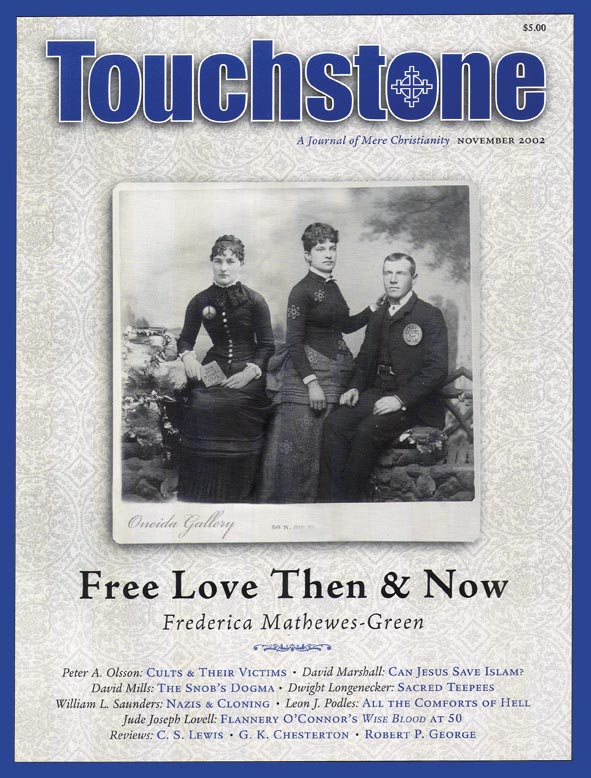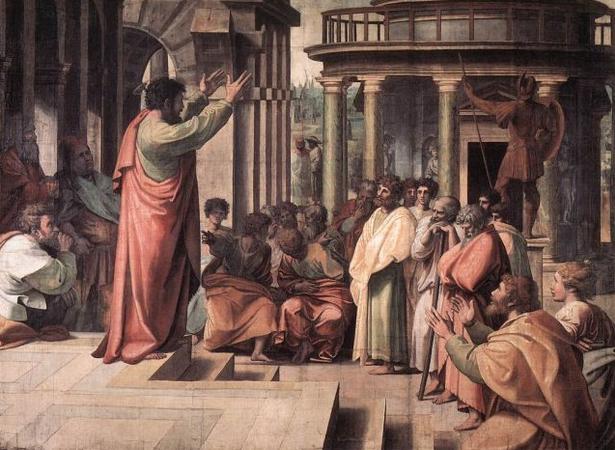The Widow in the Temple
Though naos is the Greek noun properly used to refer to the temple at Jerusalem, in the New Testament we more often find the word hieron (“holy place”) employed in this sense, particularly when the reference is to some specific part of the temple.
For example, hieron is the word-of-choice to designate the Court of Women, that precinct of the temple complex closed to Gentiles but open to Jewish women. Jewish men could congregate in that precinct as well, but the men were also free to move on to the Court of Israel, to which the women had no access. Thus, besides being the place in the temple where the women could pray (cf. Luke 2:37), the Court of Women was the one place in the temple where all Israelites could gather.
Thus, it naturally became the place where Jesus spoke when he taught in the temple (John 8:20; 18:20). It was there that his enemies found him sitting and teaching one morning, when they came dragging a woman who had been taken in adultery during the preceding night (8:2f).
Naturally, too, it was to the Court of Women that mothers brought their purification offerings after the birth of their children. Standing at that precinct’s inner gate, they could look across and see the altar on which the designated lamb (or, in the case of the poor, the pair of turtledoves—Luke 2:24) was offered on such occasions.
One of the notable features of the Court of Women was the glazophylakion or “treasury,” thirteen trumpet-shaped receptacles placed there to receive the offerings of the faithful for the maintenance of the temple and its ministry. Because pagan coinage was often adorned with engravings of political leaders and images from mythology, such “idolatrous” money could not be placed in the temple treasury. For this reason there were money-changers in the temple to provide the acceptable coinage for the offerings. Since they were not expected to work for free, the monetary exchange involved a measure of profit for the exchangers (much as we have today in international airports), and on at least one occasion our Lord seems to have manifested a rather dim view of such transactions.
One day the Lord called attention to a poor widow whom he saw casting her last two coins into the treasury. These coins (lepta) were so small that they had no strict equivalence in the imperial monetary system, and because they would not be familiar to Mark’s readers at Rome, he explained that two of them were needed to equal a single quadrans (12:42).
Jesus knew that these two small pieces of change were the sum of this poor widow’s assets (pace Rudolph Bultmann, who doubted how Jesus could possibly have known this!). Therefore, it is significant that she gave both of them, holding back nothing for herself.
For Jesus this latter fact became a point of contrast between the widow and the wealthier benefactors of the temple (Mark 12:43f; Luke 21:4). Unlike the latter, this woman was giving “all her life” (holon ton bion in Mark 12:44). Jesus knew that, if a woman is reduced even to ten coins, the loss of a single one of them is a matter of considerable concern and industry (cf. Luke 15:8–10). Moreover, given the grandeur of the temple and the magnitude of its economic base, this lady might have been tempted to feel that her tiny gift was insignificant, even futile. Such is the context in which our Lord speaks of her bravery and generosity.
Our Lord’s reaction was typical of him, nor was this the only occasion on which he took compassion on a widow (cf. Luke 7:11–17). Indeed, he was obviously fond of an old story of a strikingly similar widow who likewise sacrificed her last resources to advance God’s cause (1 Kings 17:8–16; Luke 4:25f).
It is further significant that the gospel accounts of this poor widow in the temple place her in the context of the Lord’s Passion. In Mark she comes at the end of five stories of conflict between Jesus and his enemies (11:27—12:40) and immediately prior to his final great discourse (which commences with a remark about the grandeur of the temple!—13:1), while in Luke she appears in the chapter before the Sanhedrin’s plot to kill Jesus (21:2–4; 22:2–6). Giving her all for God, this widow thus becomes a symbol or type of Christ himself, who will lay down his life (bios) to advance God’s cause.
Patrick Henry Reardon is pastor emeritus of All Saints Antiochian Orthodox Church in Chicago, Illinois, and the author of numerous books, including, most recently, Out of Step with God: Orthodox Christian Reflections on the Book of Numbers (Ancient Faith Publishing, 2019).
subscription options
Order
Print/Online Subscription

Get six issues (one year) of Touchstone PLUS full online access including pdf downloads for only $39.95. That's only $3.34 per month!
Order
Online Only
Subscription

Get a one-year full-access subscription to the Touchstone online archives for only $19.95. That's only $1.66 per month!
bulk subscriptions
Order Touchstone subscriptions in bulk and save $10 per sub! Each subscription includes 6 issues of Touchstone plus full online access to touchstonemag.com—including archives, videos, and pdf downloads of recent issues for only $29.95 each! Great for churches or study groups.
Transactions will be processed on a secure server.
more from the online archives
calling all readers
Please Donate
"There are magazines worth reading but few worth saving . . . Touchstone is just such a magazine."
—Alice von Hildebrand
"Here we do not concede one square millimeter of territory to falsehood, folly, contemporary sentimentality, or fashion. We speak the truth, and let God be our judge. . . . Touchstone is the one committedly Christian conservative journal."
—Anthony Esolen, Touchstone senior editor










